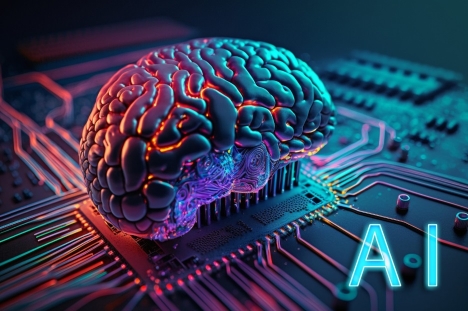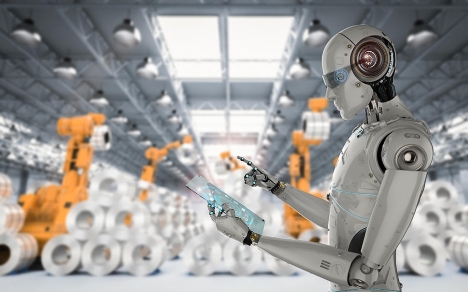How Artificial Intelligence is Changing Our Industries
Professionals with an interest in learning AI are finding themselves at the forefront of this revolution, witnessing firsthand how AI is reshaping traditional sectors and creating new opportunities. Let’s examine the profound impact of AI on various industries and the relevance of learning skills like AI prompts as things change.
Industries Embracing AI Transformation
1. Healthcare
AI has ushered in a new era in healthcare, from diagnostics to treatment. Machine learning algorithms analyze medical data with unprecedented speed and accuracy, aiding in early disease detection and personalized medicine. Professionals in healthcare are increasingly relying on AI to enhance patient care, optimize hospital operations, and streamline administrative tasks.
Healthcare professionals can benefit from learning AI prompts to design algorithms for medical imaging, drug discovery, and patient care. Prompt engineering skills can facilitate the creation of more efficient and precise models, contributing to improved diagnostics and treatment outcomes.
2. Finance
The finance industry has embraced AI for risk management, fraud detection, and algorithmic trading. Machine learning algorithms analyze vast datasets in real time, providing insights that traditional methods might overlook. AI also plays a significant role in customer service through chatbots and virtual assistants, enhancing the banking experience.
Financial professionals can leverage AI prompts to develop predictive models for stock market trends, credit scoring, and customer behavior analysis. The ability to craft effective prompts is crucial for generating accurate and actionable insights in the dynamic financial landscape.
3. Manufacturing
AI revolutionizes manufacturing processes through predictive maintenance, quality control, and supply chain optimization. Smart factories powered by AI-driven technologies enhance efficiency, reduce downtime, and minimize defects. Professionals in manufacturing are adapting to a more data-driven approach, leveraging AI to achieve higher productivity and cost savings.
Understanding AI prompts is essential for manufacturing professionals to create predictive maintenance, defect detection, and production optimization algorithms. Prompt engineering skills enable the customization of AI models to address specific challenges in the manufacturing environment.
4. Education
The education sector is experiencing a paradigm shift with the integration of AI. Personalized learning platforms, intelligent tutoring systems, and educational chatbots are reshaping the way students learn. AI is helping educators tailor lessons to individual needs, providing a more engaging and effective learning experience.
Relevance of Learning AI Prompts: Educators and instructional designers can use AI prompts to develop personalized learning materials and adaptive assessments. The ability to craft prompts that align with educational objectives enhances the effectiveness of AI-driven tools in the learning environment.
AI in Lesser-Known Industries
1. Agriculture
In the agricultural sector, AI optimizes crop yields, predicts disease outbreaks, and monitors soil conditions. Drones equipped with AI technology provide real-time insights into crop health, enabling farmers to make data-driven decisions. AI is playing a pivotal role in sustainable agriculture practices.
2. Entertainment
AI is transforming the entertainment industry by enhancing content creation, recommendation systems, and virtual reality experiences. Algorithms analyze user preferences to recommend personalized content, while AI-generated media is becoming increasingly prevalent. Professionals in the entertainment industry are exploring new creative possibilities with the aid of AI.
3. Human Resources
AI is streamlining human resources processes, from recruitment to employee engagement. Intelligent algorithms assist in identifying suitable candidates, predicting employee turnover, and optimizing workforce management. HR professionals leverage AI to make data-driven decisions, contributing to a more productive and satisfied workforce.
4. Business Enterprises
In enterprise settings, generative transforms business functions, reduces costs, disrupts product cycles, and creates unprecedented process efficiencies. Businesses that have successfully adopted generative AI highlighting the importance of proper data architecture, effective governance, and copyright considerations. It suggests a strategic and evolutionary approach to implementation, emphasizing the need for organizations to pick use cases wisely and apply generative AI’s unique capabilities to solve existing problems.
Moreover, AI is making significant contributions to areas like emergency response, language learning, accessibility for people with disabilities, and recruitment processes, where algorithms analyze resumes and reduce bias in hiring.
As we continue to see changes taking place through artificial intelligence for industries, professionals must stay abreast of AI developments and acquire relevant skills to thrive in sectors transforming. As AI continues to evolve, it will undoubtedly present more unexpected solutions in surprising places, including assisting in space exploration and even creating innovative recipes in the realm of cooking.
Relevant AI and Tech-Related Skills
1. Machine Learning and Deep Learning: Professionals seeking a role in industries transformed by AI should have a strong foundation in machine learning and deep learning. Understanding algorithms, model training, and neural networks is essential for developing effective AI solutions.
2. Data Science: Proficiency in data science is crucial for extracting meaningful insights from large datasets. Data scientists play a key role in shaping AI models by preprocessing data, selecting features, and ensuring the quality of input data.
3. Natural Language Processing (NLP): NLP is essential for industries where language is crucial, such as healthcare, finance, and customer service. Professionals with NLP expertise can develop AI applications that understand, interpret, and generate human-like language.
4. Programming and Coding Skills: Strong programming skills, especially in languages like Python, are fundamental for AI professionals. Coding proficiency enables the implementation of AI algorithms and the development of scalable and efficient solutions.
5. Ethical AI: As AI becomes more pervasive, professionals must be well-versed in ethical considerations surrounding AI applications. Understanding bias, privacy concerns, and the ethical implications of AI decisions is crucial for responsible AI development.
Artificial Intelligence for Industries in 2024
PricewaterhouseCoopers sees a transformative impact of artificial intelligence (AI) in 2024, particularly emphasizing the role of generative AI (GenAI) in reshaping business operations. With 73% of US companies adopting AI, GenAI leads the way, implemented by 54% of surveyed companies a year after ChatGPT’s market entry.
Their predictions for 2024 include leveraging GenAI for transformative value, prioritizing scalable patterns, and incentivizing employees to reimagine their roles. Leadership and workforce skills are deemed crucial, especially in the C-suite, as AI is expected to change how everyone, from middle managers to top executives, approaches their jobs. Trust in AI is emphasized, urging companies to embed responsible AI practices from the beginning and involve the entire C-suite to maintain trust as GenAI takes on more tasks.
Artificial intelligence is a powerful force reshaping industries and creating new possibilities for professionals across diverse sectors. Learning AI prompts and developing prompt engineering skills can provide professionals with a competitive edge in crafting effective AI solutions.
As industries continue to evolve, staying abreast of the latest AI developments and acquiring the necessary skills will be a top priority for professionals interested in AI for industries. Whether in healthcare, finance, manufacturing, or lesser-known sectors, the impact of AI is undeniable, and professionals with AI expertise are at the forefront of shaping the future.
Tags: artificial intelligence, business, business intelligence














































